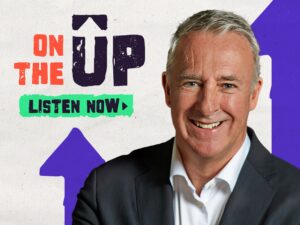
Welcome to another episode of On the Up, Moneypenny’s podcast dedicated to exploring growth, innovation, and the strategies that drive business success.
In this episode, Dan Marshall sits down with Peter Knight, business leader, speaker, and author known for his work with Property Academy, to discuss what it really takes to be an effective leader in today’s rapidly changing business landscape.
Leadership isn’t just about having the right title or being the loudest voice in the room. In this insightful conversation, Peter shares his philosophy on what makes truly effective leaders stand out from the crowd – and why the combination of hunger and humility might be the secret sauce that separates good leaders from great ones.
The discussion takes us through Peter’s unique perspective on leadership, drawn from his extensive experience working across different industries. From defining what leadership actually means to exploring how leaders can maintain their edge as their businesses grow, Peter provides practical wisdom for anyone looking to develop their leadership skills.
If you’re leading a team, building a business, or simply curious about what separates effective leaders from the rest, this episode offers valuable insights for creating lasting impact and building organisations that thrive beyond any single individual.
Peter cuts through the complexity of leadership definitions with a simple truth: “The one thing that all leaders have is followers.” Leadership isn’t about commanding from the top down; it’s about attracting people who want to align themselves with your vision and work toward a common cause. Whether that cause is commercial success or something more profound, the ability to draw people in and inspire them to follow is what defines true leadership.
Drawing from Jim Collins’ concept of Level 5 leadership, Peter emphasises that the most effective leaders combine relentless hunger for improvement with genuine humility. As he explains, many leaders start with both qualities – they’re driven to succeed but humble because they haven’t achieved anything yet. The challenge comes as success grows: “Often the appetite diminishes a bit, and unfortunately the humility does too.” Maintaining this balance is essential but difficult.
Peter advocates for a focused leadership approach: be responsible for the overarching vision and purpose, dive deep into the details to ensure execution, but get completely out of the way in the middle. As he puts it, using advice from his wife: “I’m going to be responsible for absolutely nothing, but I’m going to be available to everyone.” This means enabling others to take responsibility while being there to support and remove barriers.
Quoting Stephen Covey, Peter highlights a fundamental principle of empowering leadership. If leaders want their teams to deliver results, they need to define the desired outcome clearly but allow people to choose their own methods. He shares practical advice from a non-executive director: out of ten decisions, seven will be the same as yours, two will be different but achieve the same outcome, and one might be different with a better result than you would have achieved.
While everyone focuses on AI and technological disruption, Peter argues that we’re experiencing an equally significant cultural revolution. From changing work patterns to different generational expectations, leaders must navigate these cultural shifts alongside technological advancement. The key is maintaining a culture of learning, improvement, and development while embracing new tools and ways of working.
Peter advocates for maintaining an exploratory mindset, even when it seems inefficient in the short term. Whether it’s brainstorming sessions with new team members or allowing people to fail and learn, leaders who embrace continuous exploration will outperform those who stick to “steady as she goes” approaches. As businesses become more successful, they often become more protective and risk-averse – but this can be their downfall.
Peter recommends starting with Stephen Covey’s “Seven Habits of Highly Effective People” for anyone new to leadership, but his deeper recommendation is Covey’s lesser-known “Principle Centred Leadership” – which takes the seven habits from personal to organisational level.
For those navigating the challenging transition from startup to scale-up, he suggests Jim Collins’ “Beyond Entrepreneurship” (originally styled as James Collins), particularly the first third of the book, which focuses on moving from an entrepreneurial environment to a medium-sized business.
Listen now to the full episode with Peter Knight as he reveals more insights about building lasting leadership capabilities and creating organisations that can thrive beyond any individual leader.
Looking for more business insights? Discover our full collection of On the Up podcast episodes, brought to you by Moneypenny.
Your own PA to look after calls, qualify leads, book appointments, and lots more.
Discover >Our team of PAs capturing every new enquiry and qualifying them during the call.
Discover >